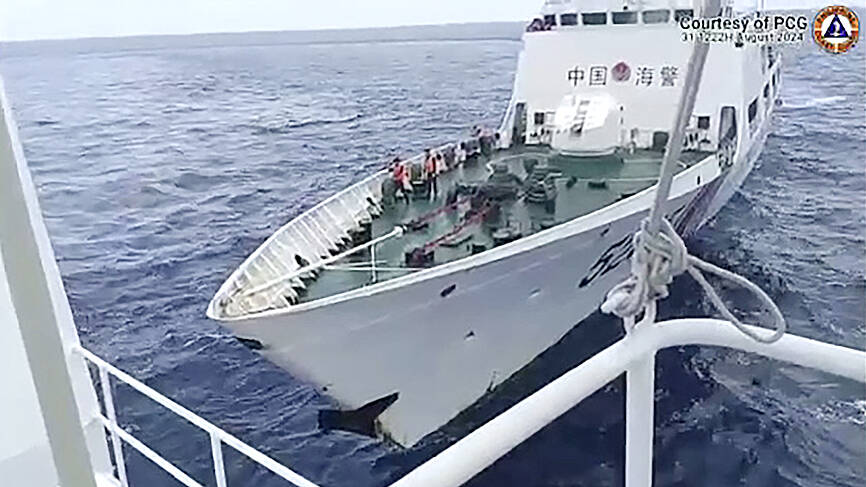The Philippines and China yesterday exchanged accusations of intentionally ramming coast guard vessels in disputed waters of the South China Sea, while separately, Japan accused Beijing of intruding into its territorial waters.
The collision near Sabina Shoal (Sianbin Shoal, 仙濱暗吵) in the Spratly Islands (Nansha Islands, 南沙群島) — which Taiwan also claims — was the fifth maritime confrontation in a month between Beijing and Manila.
Philippine Coast Guard spokesman Commodore Jay Tarriela showed videos of yesterday’s confrontation at a news conference, saying that China Coast Guard vessel 5205 “directly and intentionally rammed the Philippine vessel” without provocation.

Photo: AFP / Philippine Coast Guard
The ramming damaged the 97m Teresa Magbanua, one of the Philippines’ largest coast guard cutters, but no personnel were injured, Tarriela said.
China Coast Guard spokesman Liu Dejun (劉德軍) said in a statement that a Philippine ship, “illegally stranded” at the shoal, had lifted anchor and “deliberately rammed” a Chinese vessel.
He called on the Philippines to withdraw immediately or bear the consequences.
“The Chinese coast guard will take the measures required to resolutely thwart all acts of provocation, nuisance and infringement and resolutely safeguard the country’s territorial sovereignty and maritime rights and interests,” Liu said.
Tarriela said that Manila would not withdraw its ship “despite the harassment, the bullying activities and escalatory action of the Chinese coast guard.”
The Philippines deployed a ship in April to Sabina Shoal, which is about 140km from the Philippine province of Palawan.
Manila accused Beijing of building an artificial island, saying it had documented piles of dead and crushed coral on the sandbars, which Beijing denies.
Separately, a Chinese People’s Liberation Army Navy survey vessel briefly entered Japanese territorial waters, the Japanese Ministry of Defense said.
The ship was detected in Japanese territory off Kagoshima Prefecture at about 6am and had departed by 7:53am, the ministry said on its Web site.
It was the 10th time over the past year that a Chinese navy survey ship has sailed through Japan’s territorial waters, and the 13th time if submarines and intelligence-gathering vessels are included, national broadcaster NHK reported.

CHAOS: Iranians took to the streets playing celebratory music after reports of Khamenei’s death on Saturday, while mourners also gathered in Tehran yesterday Iranian Supreme Leader Ayatollah Ali Khamenei was killed in a major attack on Iran launched by Israel and the US, throwing the future of the Islamic republic into doubt and raising the risk of regional instability. Iranian state television and the state-run IRNA news agency announced the 86-year-old’s death early yesterday. US President Donald Trump said it gave Iranians their “greatest chance” to “take back” their country. The announcements came after a joint US and Israeli aerial bombardment that targeted Iranian military and governmental sites. Trump said the “heavy and pinpoint bombing” would continue through the week or as long

TRUST: The KMT said it respected the US’ timing and considerations, and hoped it would continue to honor its commitments to helping Taiwan bolster its defenses and deterrence US President Donald Trump is delaying a multibillion-dollar arms sale to Taiwan to ensure his visit to Beijing is successful, a New York Times report said. The weapons sales package has stalled in the US Department of State, the report said, citing US officials it did not identify. The White House has told agencies not to push forward ahead of Trump’s meeting with Chinese President Xi Jinping (習近平), it said. The two last month held a phone call to discuss trade and geopolitical flashpoints ahead of the summit. Xi raised the Taiwan issue and urged the US to handle arms sales to

BIG SPENDERS: Foreign investors bought the most Taiwan equities since 2005, signaling confidence that an AI boom would continue to benefit chipmakers Taiwan Semiconductor Manufacturing Co’s (TSMC, 台積電) market capitalization swelled to US$2 trillion for the first time following a 4.25 percent rally in its American depositary receipts (ADR) overnight, putting the world’s biggest contract chipmaker sixth on the list of the world’s biggest companies by market capitalization, just behind Amazon.com Inc. The site CompaniesMarketcap.com ranked TSMC ahead of Saudi Aramco and Meta Platforms Inc. The Taiwanese company’s ADRs on Tuesday surged to US$385.75 on the New York Stock Exchange, as strong demand for artificial intelligence (AI) applications led to chip supply constraints and boost revenue growth to record-breaking levels. Each TSMC ADR represents

State-run CPC Corp, Taiwan (CPC, 台灣中油) yesterday said that it had confirmed on Saturday night with its liquefied natural gas (LNG) and crude oil suppliers that shipments are proceeding as scheduled and that domestic supplies remain unaffected. The CPC yesterday announced the gasoline and diesel prices will rise by NT$0.2 and NT$0.4 per liter, respectively, starting Monday, citing Middle East tensions and blizzards in the eastern United States. CPC also iterated it has been reducing the proportion of crude oil imports from the Middle East and diversifying its supply sources in the past few years in response to geopolitical risks, expanding